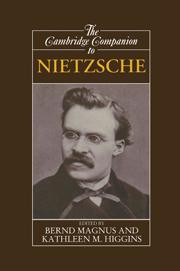Introduction to the Cambridge companion to Nietzsche
Published online by Cambridge University Press: 28 May 2006
Summary
The importance to the humanities and to our culture of the nineteenth-century German philosopher and writer Friedrich Nietzsche may require little motivation or discussion. He was quite simply one of the most influential modern European thinkers. His attempts to unmask the root motives which underlie traditional Western philosophy, morality, and religion have deeply affected subsequent generations of philosophers, theologians, psychologists, poets, novelists and playwrights. Indeed, one contemporary English-speaking philosopher, Richard Rorty, has characterized the entire present age as “post-Nietzschean.” That is because Nietzsche was able to think through the consequences of the triumph of the Enlightenment's secularism - captured in his observation that “God is dead” - in a way that determined the agenda for many of Europe's most celebrated intellectuals after his death in 1900. An ardent foe of nationalism, anti-Semitism, and power politics, his name was later invoked by Fascists and Nazis to advance the very things he loathed.
- Type
- Chapter
- Information
- The Cambridge Companion to Nietzsche , pp. 1 - 18Publisher: Cambridge University PressPrint publication year: 1996
- 1
- Cited by



